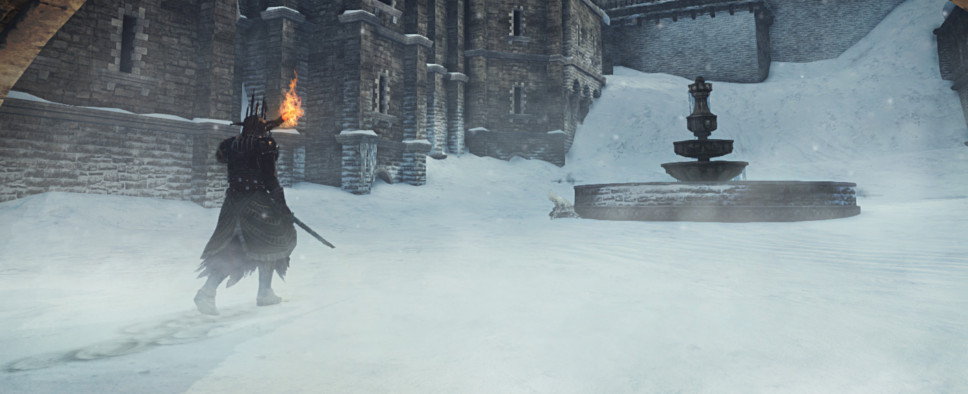Dark Souls II: Crown of the Ivory King Review
-
Category: ReviewsHits: 10705

Article Index
Lore, Soundtrack and Art Style
If the original Dark Souls was arguably first and foremost about the dichotomy between light and darkness, Crown of the Ivory King finds its thematic and artistic foundation in another kind of dichotomy or, as the original Dark Souls' intro put it, disparity: the one between heat and cold. What was once a grand kingdom built by a brave king has been made frigid and lifeless, and its great knights now sit crestfallen without anyone to serve or a population to defend. Dark Souls' Lordran and Demon's Souls' Boletarian Palace looked decadent and somewhat grotesque, almost as if life had ground to a halt due to a plague. Eleum Loyce's chilling stillness is more reminiscent of a ghost town, on the other hand: the area is empty and shows no trace of life at all, even though the place was clearly built to be inhabited. In a way that's probably at least partially unintentional: the way most interiors are stark and unadorned makes me suspect the developers simply didn't have the time to go through them for a detail-oriented art pass. Nevertheless, while it might have been unintentional, it still fits the overall tone of the DLC and reinforces the image of a city devoid of life and warmth.
The simple color palette, mostly blues, whites and browns, and the Gothic architecture help in lending the image a coherent quality, one that gets broken to great effect with the visuals of the final encounter of the DLC, the heat to the rest of the DLC's cold. I don't want to get unbearably pretentious, so I'll just note that the purity and simplicity of the narrative feel well at home in its snow white Gothic burg. Crown of the Ivory King is, like the other DLCs, almost completely devoid of talking NPCs, with the silence only broken occasionally by sound effects and a couple of well-written atmospheric pieces of music. I say almost, though, because there is one notable exception. A warden guards the place and addresses you directly, serving as a guide and narrator of sorts. While the developers stayed shy of filling the gaps and still left some room for interpretation on part of the players, there is a crystal clear story here that is told in no uncertain terms by one of its actors. It's a story arc that's already played out by the time the game begins, and while it could be argued that that's true of the stories of most Dark Souls' areas, it's made particularly clear here. This melancholic air is particularly apt, as I imagine for many this DLC will be their final Dark Souls II adventure.
There is, of course, also a finale of sorts for the very thin story arc that ties the three DLC together. Accessible only after the three crowns have been found and brought back, it's an anticlimax that doesn't feel like it quite fits the themes of the story and is rather meaningless in terms of gameplay. What it provides is additional closure and an acknowledgement of the effort and money invested by a dedicated subset of players, which I suppose is both the reason it ultimately matters, and also why it can't be anything more than what it is.
Concluding Thoughts
Crown of the Ivory King has a number of flaws that make me wary of calling it the best of the three DLCs released for Dark Souls II, but it certainly feels like the largest and most interesting of them. More importantly, it provides a satisfying conclusion to the Lost Crowns trilogy, which overall ranks among the best DLC I've ever played. There have been, of course, lost opportunities along the way that are worth mentioning: many of the multiplayer problems the game launched with are still present almost 7 months later, the story additions didn't help illuminate the most confusing parts of the main game, and the so-called challenge routes ended up being a good idea executed terribly. Ultimately, though, the problems are overshadowed by what the DLCs did right: they offered the three best areas of the game, subtly toyed with the game's formula, and offered a variety of new challenges that felt fair and satisfying to overcome. From Software has yet to announce whether Bloodborne will get any downloadable content post-release, but based on their track record I certainly wouldn't mind if it did. They have proven to be capable of crafting the right kind of DLC: sizable, compelling and fun.

